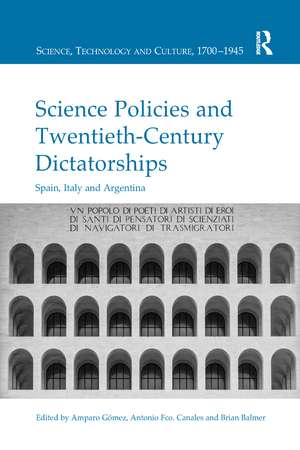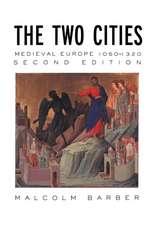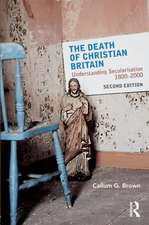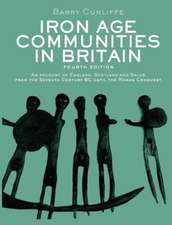Science Policies and Twentieth-Century Dictatorships: Spain, Italy and Argentina: Science, Technology and Culture, 1700-1945
Editat de Amparo Gómez, Antonio Fco. Canales, Brian Balmeren Limba Engleză Paperback – 30 iun 2020
| Toate formatele și edițiile | Preț | Express |
|---|---|---|
| Paperback (1) | 259.98 lei 43-57 zile | |
| Taylor & Francis – 30 iun 2020 | 259.98 lei 43-57 zile | |
| Hardback (1) | 1005.73 lei 43-57 zile | |
| Taylor & Francis – 28 aug 2015 | 1005.73 lei 43-57 zile |
Din seria Science, Technology and Culture, 1700-1945
-
 Preț: 310.88 lei
Preț: 310.88 lei -
 Preț: 469.34 lei
Preț: 469.34 lei -
 Preț: 469.34 lei
Preț: 469.34 lei - 12%
 Preț: 299.52 lei
Preț: 299.52 lei -
 Preț: 469.34 lei
Preț: 469.34 lei -
 Preț: 469.34 lei
Preț: 469.34 lei -
 Preț: 489.26 lei
Preț: 489.26 lei -
 Preț: 464.12 lei
Preț: 464.12 lei -
 Preț: 489.26 lei
Preț: 489.26 lei - 26%
 Preț: 821.13 lei
Preț: 821.13 lei -
 Preț: 469.34 lei
Preț: 469.34 lei -
 Preț: 469.34 lei
Preț: 469.34 lei -
 Preț: 486.49 lei
Preț: 486.49 lei -
 Preț: 416.22 lei
Preț: 416.22 lei -
 Preț: 469.34 lei
Preț: 469.34 lei -
 Preț: 469.34 lei
Preț: 469.34 lei - 17%
 Preț: 259.98 lei
Preț: 259.98 lei - 12%
 Preț: 299.52 lei
Preț: 299.52 lei - 26%
 Preț: 821.13 lei
Preț: 821.13 lei -
 Preț: 489.26 lei
Preț: 489.26 lei - 20%
 Preț: 250.58 lei
Preț: 250.58 lei - 26%
 Preț: 876.78 lei
Preț: 876.78 lei -
 Preț: 384.66 lei
Preț: 384.66 lei - 16%
 Preț: 261.54 lei
Preț: 261.54 lei - 18%
 Preț: 1001.77 lei
Preț: 1001.77 lei
Preț: 259.98 lei
Preț vechi: 311.41 lei
-17% Nou
Puncte Express: 390
Preț estimativ în valută:
49.75€ • 52.07$ • 41.41£
49.75€ • 52.07$ • 41.41£
Carte tipărită la comandă
Livrare economică 31 martie-14 aprilie
Preluare comenzi: 021 569.72.76
Specificații
ISBN-13: 9780367598303
ISBN-10: 0367598302
Pagini: 244
Dimensiuni: 156 x 234 mm
Greutate: 0.45 kg
Ediția:1
Editura: Taylor & Francis
Colecția Routledge
Seria Science, Technology and Culture, 1700-1945
Locul publicării:Oxford, United Kingdom
ISBN-10: 0367598302
Pagini: 244
Dimensiuni: 156 x 234 mm
Greutate: 0.45 kg
Ediția:1
Editura: Taylor & Francis
Colecția Routledge
Seria Science, Technology and Culture, 1700-1945
Locul publicării:Oxford, United Kingdom
Cuprins
Preface, Amparo Gómez, Antonio Fco. Canales and Brian Balmer; Science policy under democracy and dictatorship: an introductory essay, Amparo Gómez, Brian Balmer and Antonio Fco. Canales; The ‘social contract’ for Spanish science before the Civil War, Amparo Gómez; Spanish science: from the convergence with Europe to purge and exile, Francisco A. González Redondo; The reactionary utopia: the CSIC and Spanish imperial science, Antonio Fco. Canales; Broken science, scientists under suspicion. Neuroscience in Spain during the early years of the Franco dictatorship, Rafael Huertas; Cultures of research and the international relations of physics through Francoism: Spain at CERN, Xavier Roqué; The National Council for Research in the context of Fascist autarky, Roberto Maiocchi; Statistical theory, scientific rivalry and war politics in Fascist Italy (1939-1943), Jean-Guy Prévost; Science, military dictatorships and constitutional governments in Argentina, Pablo Miguel Jacovkis; Science policy in Argentina during the ‘Dirty War’, Diana Maffía; Appendix; Index.
Notă biografică
Amparo Gómez is Professor of Philosophy of Science in the Department of History and Philosophy of Science, Education and Language of the University of La Laguna.
Antonio Fco. Canales is Lecturer of Theory and History of Education in the same Department.
Brian Balmer is Professor of Science Policy Studies in the Department of Science and Technology Studies, University College London.
Antonio Fco. Canales is Lecturer of Theory and History of Education in the same Department.
Brian Balmer is Professor of Science Policy Studies in the Department of Science and Technology Studies, University College London.
Descriere
Making a fresh contribution to the political history of science, this book explores the connections between the science policies of three countries that each experienced considerable political upheaval in the twentieth century: Spain, Italy and Argentina. By focussing on these three countries, the contributors are able to present case studies that
















